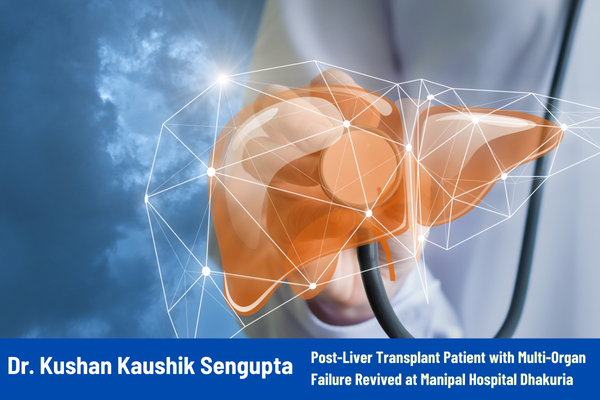Post-Liver Transplant Patient with Multi-Organ Failure Revived at Manipal Hospital Dhakuria
A 66-year-old liver transplant recipient battled severe infection, renal failure, and septic shock. Timely ICU care at Manipal Hospital Dhakuria saved his life.


A Post-Liver Transplant Patient with Multi-Organ Dysfunction and Shock Revived at Manipal Hospital Dhakuria
For a 66-year-old man with a history of liver cirrhosis and liver transplantation just two years ago in Chennai, life took an unexpected turn once again.
After his transplant, he developed abdominal tuberculosis and ascites (fluid accumulation in the abdominal cavity) last year and was placed on long-term medications. Despite these challenges, he continued his routine life—until he suddenly landed in a critical condition at Manipal Hospital Dhakuria.
Critical Presentation
He arrived with complaints of:
Extreme generalized weakness
Inability to eat
Reduced urine output
Investigations revealed:
Severe anaemia
Infection in abdominal fluid
Renal failure
Within a day, his condition worsened dramatically—he developed septic shock, altered sensorium, reduced urine output, and breathing difficulty.
Intensive Care Journey
The patient was immediately shifted to the ICU where a series of life-saving interventions were initiated:
Ventilatory support: He was intubated and placed on a ventilator.
Blood pressure support: Inotropic medications were started.
Advanced antimicrobials: Antibiotics and antifungals were escalated to fight severe infections.
Dialysis: Commenced to manage renal failure and severe acid accumulation.
Blood transfusions: Given to correct severe anaemia.
Road to Recovery
Gradually, his blood pressure stabilized, and inotropic support was tapered.
After four dialysis sessions, his urine output improved, and dialysis was stopped.
A few days later, his sensorium improved, and he started responding to commands.
As his breathing normalized, ventilatory support was weaned off and he was successfully extubated.
Eventually, he was able to sit, eat on his own, and regain stability. He was discharged on medications for liver transplant maintenance and tuberculosis treatment. Today, he continues regular follow-ups and is doing well.
Key Medical Insight
Patients who undergo liver transplantation are prescribed immunosuppressive medications to prevent organ rejection. However, these drugs also make them:
More vulnerable to infections
Prone to severe, life-threatening illness like multi-organ dysfunction and septic shock
In such cases, early detection and aggressive, multidisciplinary ICU management are the difference between life and death.
Conclusion
This case highlights the expertise of Manipal Hospital Dhakuria in managing critically ill post-transplant patients. With timely intervention, advanced critical care, and strong multidisciplinary teamwork, even patients with multi-organ failure and shock can be revived to lead a healthy, stable life again.